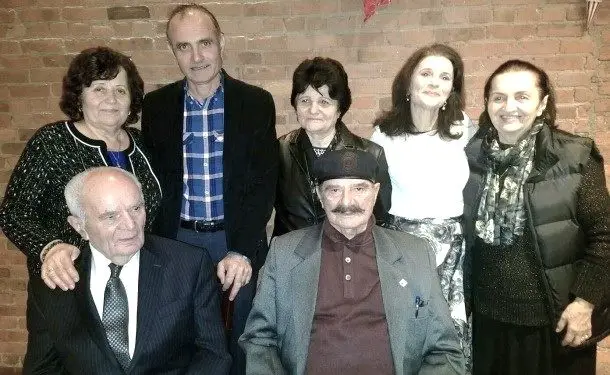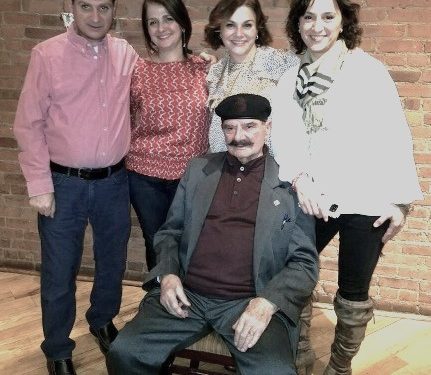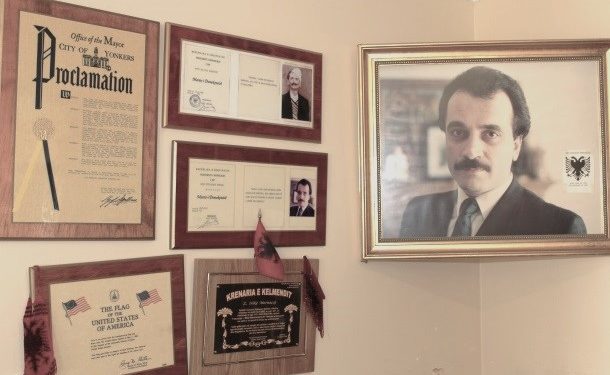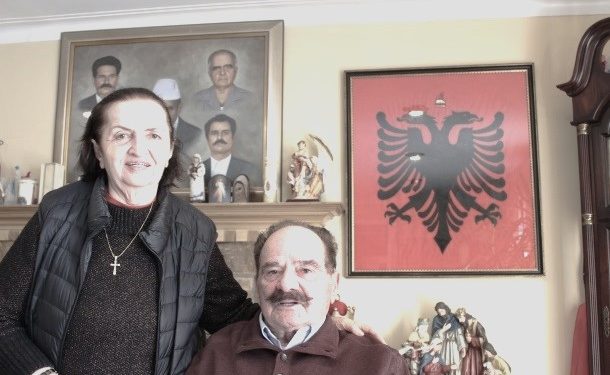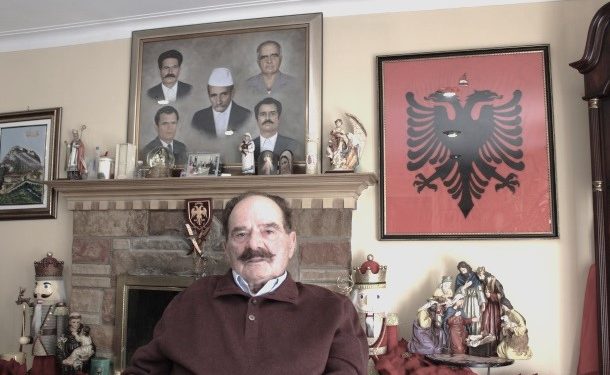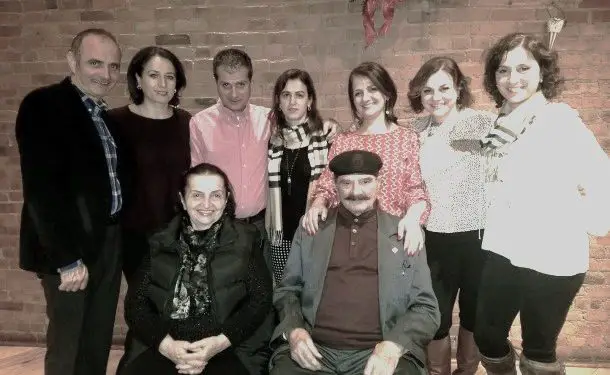By Dalip Greca
Memorie.al / On Sunday, December 18, 2016, while the “Kelmendi Dinner” was being generously served at Eastwood Manor, in the Bronx, NY, the Kelmendi organizers had prepared a surprise for the head of the Mërnaçaj family, Marashi: A cake for the 90th anniversary of his birth. Marashi, Mrija, his sons and daughters, grandchildren, and the entire extended Mërnaçaj family were thrilled, who, like every year, were part of the ‘Kelmendi Dinner’, full of epic songs and traditional dances. On Wednesday, December 21, 2016, at “Zuppa Restaurant” in Yonkers, the extended family and friends gathered, all together celebrating the 90th anniversary of his birth….!
…I had been thinking for a while about having a conversation with Marash, to enter his memory and to journey through the history of the family, a symbol of democracy and anti-communism, mentioned even in the White House, and even by American presidents (when President Ford signed the granting of American citizenship to mother Mrika, at the age of 111, or when the Albanian Flag was raised in the Capitol, in honor of the Albanian Hero of Democracy, Nik Marash Mërnaçaj)… When, better than now, when he is celebrating his 90th birthday, would I be given the opportunity to have a conversation?! Together with Marash’s nephew, Mark Mërnaçaj, on Thursday, December 22, 2016, at noon, I knocked on his house in Yonkers.
Without sitting down properly, Mrija, the lady of the house, filled the table to the brim. Every time I met Mrija, I noticed nobility and kindness in her face, in her behavior, in the typical generosity of Kelmend, but it is enough to enter her spiritual world and you will discover how much pain and tragedy, caused by the communist dictatorship, the soul of the noble highlander carries: Her father, Dede Bajraktari, was captured by the communists and, while he was suffering from bullet wounds, they took him into the house and burned him alive, while her cousins were massacred; one of them was cruelly tortured, his eyes gouged out, and covered with stones….!
Mrija’s last wound, which still bleeds with pain, is Nika, who, while giving the final blow from America to the Albanian dictatorship, which had caused so many wounds to Kelmendi and the Mërnaçaj family, lost her life mysteriously, with a hit from behind by a truck, on her way back from the anti-communist demonstration, where she had gone with 20 friends from New York to Detroit….! Mrija still retains the image of the smiles and kisses that Nika gave her on the forehead, when she was going to or coming back from work. Even on that last day…! “How much they begged her not to go to that harsh winter weather, to the demonstration in Detroit! Ah, the pawn of mother and father”! The soul hurts….!
…Marashi, as if he doesn’t care about the 90 years of his life, stands like an oak tree, without bending at all under the weight of the years. His memory is clear. Sitting in front of the national flag, he begins to tell me about his 90-year life. At the front of the waiting room, next to the National Flag, is a photo frame with 5 portraits of his family: In the center is his father Ndue, surrounded by his sons: Nikolla, who died from the suffering of the dictatorship, 20 years of imprisonment and the same amount of exile, died a few days after his second imprisonment, Rroku, who passed away in the USA and further, the living: Marashi and Pjetri….!
I knock on the memory of this old man, who comes from the tribe of the Kelmendese anti-communist resistance and I look for traces of his life…! From his distant childhood, he recalls his father’s stories about Kelmendi’s resistance to the Slavs, who set Kelmendi on fire and drowned it in blood, but who never conquered it, nor did the Turks, who failed to make Kelmendi their own, nor the Italians and Germans, while from his youth, he brings images of the war and resistance against the communists, who wanted to subjugate Kelmendi by force. In his eyes, the fratricidal war of Kelmendi took place, January 1945. He was a young man of 18 years at the time. His memory is filled with macabre images: wiretaps, traps, arrests, murders, shootings, deportations…!
– “The Kelmendi War forever separated Kelmendi from the communists”, says Marashi…! Historians still discuss, debate and contradict each other, whether or not that bloody confrontation of the Kelmendi people with the dictatorship that was being violently installed was an Uprising. What did the Persecution Forces want in Kelmendi? From whom would they free the crown of Albanian bravery? The Germans had fled in time! But what else could that war be, where there were 83 killed (shot), 69 wounded, more than 30 houses burned, dozens of Kelmendi people arrested, dozens of prisoners, hundreds deported to internment camps (death camps)? Since the Kelmendi war, the Kelmendi people began their ordeal of suffering in the dictatorship’s prisons and internment camps. Communism tried to defeat their mountain pride, but they did not submit. Typical is Nikolla, Marashi’s brother…!
Right after the Kelmendi war, Marash Mërnaçaj and his brother, Rroku, were taken as soldiers. 200 sons of Kelmendi were raised as soldiers, immediately after that war. During the time of military service, a full 3 years, (his brother, Rroku, served in the army for 5 years), Marashi remembers the clashes of the Pursuit Forces with the nationalist forces. He recalls the resistance of Muharrem Bajraktari and his followers, and tells of the murder of Destan Rexhepi and other brave nationalists. He was also a soldier in some of the brave Bajraktari’s persecutions.
– “Muharrem Bajraktari was brave, experienced, and smart. He knew how to protect himself,” says Marashi and remembers a moment when the Pursuit Forces captured Bajraktari’s son, wounded, and transported him to Kukës alive. “He died there. They followed the tracks straight to Muharrem’s location (it seems he was exposed by a fire lit during the day, to cook). A spy had reported. The partisan commander ordered the soldiers: If anyone turns back when we surround him, I will kill him with this cobra, and he had put his hand in his belt. So, what happened? Muharrem did not stay in one place with his fighters, but a little away, he was listening, even when his fighters were sleeping, he stayed awake, to guard against pursuers. And he skillfully used bombs to break through the sieges. That’s what happened that day. Muharrem Bajraktar’s bullets, folded the first partisan commander to the ground….”!
“They said that Muharrem Bajraktari only killed officers from the Pursuit Forces, not soldiers…! When I had crossed over to the West, – says Marashi, – I went and met Muharrem in Brussels and we talked for a long time. I told him how I had experienced the time when he was being pursued in the mountains of Albania. During the conversation, we brought up details from those events. In the end, – recalls Marashi, – I said to him: – Are you ready to go back now and go and fight the communists? I will become your soldier…! He replied: – There is no need, son, because they are killing each other. They don’t have time….”!
THE ARREST OF HIS BROTHER, NIKOLA
Marashi tells: “In 1952, they arrested Mark’s brother, Nikola, his father. The incident happened like this: Nikola was sick, lying in a bed. The commander of the Tamara Post comes with five soldiers. We wait for him. He had come before. We welcomed him as the master of the house. Nikola gets up from his bed and shakes his hand. He immediately says back: – I have a word with you, Nikola! Nikola gets up and without getting dressed, in his shirt, follows him. The minutes barely pass. We were waiting anxiously, why were they late? When the second sister arrives, who had gone to fill the water, and her face is pale, her breath caught, she asks us: – What did Nikola do that they tied him up? – Where? – we ask her worriedly….! – They tied him up to rock…she says”.
Marashi remembers details from the event: “There was a rock shelter, below the house, they had tied him up there. After a while, the commander came to us, at home, with two soldiers, the other two he had left to guard Nikolla. He ordered us all to go outside, because he had orders to search the house. He took only Mother Mrika and started the search. He found only a hunting gun, (which Marashi had with permission). They took the gun. They found 2-3 religious’ books in Italian, which Nikolla was carrying, and they took them, without knowing what they were. We went to where Nikolla was, but what could we see: He had almost frozen from the cold. He couldn’t even put on the clothes we brought him, we helped him. We parted with tears in our eyes. They took him handcuffed and went…!
…The communist reprisals were continuing. Along with Nikolla, they had arrested 12 others that night. They had also arrested a woman with four children. The next day we saw them being led away. That woman with four little ones, it was heartbreaking. What was the fault of those children, and their mother? More than 50 police forces had arrived with the head of the Shkodra Internal Affairs Branch, the sadist Hilmi Seiti. “But why did they arrest Nikolla Mrnaçaj, what had he done?” I ask Marashi.
– “Nothing. He was accused of collaborating with fascism. Like many others during the Italian occupation, Nikolla was drafted into the army in 1939 (just as the communists drafted Marashi and Rroku in 1945-46). Nikolla was then drafted into the Italian Guard, along with many other Albanians. He was then taken to Turin. The German occupation blocked the return routes and he was left stranded on the roads of Italy. When the roads were opened, he returned like many others to his Selca, where he was born, and this was all of Nikolla’s ‘fascist’ activity, which he neither killed nor harmed, but the communist regime needed an enemy to terrorize Kelemend.
Nikoolla was sentenced to 15 years, he served 10 years. He was tortured for more than 6 months in the interrogation room. The interrogation was very severe. They asked him to admit to crimes he had not committed. They had torn his nails. His fingers were twisted, bent from the tortures, which the investigators produced according to the Bolshevik school. The imprisonment was severe, they worked like slaves, and were tortured during the work. He spent his years in prison in the prison camps of Vlashuk, Seman, Rinas, Lushnja, Ura Vajgurore, etc.
THE “TRAP” OF POWER AND THE ESCAPE OF THE MËRNAÇAJ
While Nikolla’s release was approaching, he had 1 and a half months left to complete his sentence, the family received signals from their friends, who were close to the government, that a trap of new arrests was being prepared for the men of that house. The signal was given openly when at a youth meeting in Tamara, Marash’s brother, Pjetrin, was taken out. The Chairman of the Internal Affairs Branch of Shkodra, Hilmi Seiti, also participated in that meeting. They tell Pjeter: – ‘Go outside, Pjeter, but don’t go home before your friends come out’. A friend of Pjeter, when he leaves the meeting, tells him: – ‘Watch out, you have to leave’”. The message is received. They have discussed Mërnaçaj during the meeting. The storm was approaching.
After this, another family friend, who had participated in the meeting, comes and warns them: “Watch out, you are on target”!
Marashi recalls: “On the eve of the November 29th celebration that the communists were celebrating, the Council called us and asked us to give them contributions for the liberation celebration. Dad warned me not to object, but to give everything they asked. They asked for two goats with over 25 kg of meat each, 5 kg. of cheese, other foods, raki, etc. We gave them everything.” Marashi’s story is chilling: “After many signals that came to us, and we could see for ourselves, that our rope was tightening. What were we to do? The problem was our elderly parents, father Ndue, he was almost 90 years old, mother a little younger, but old and she…! Would they be able to withstand the difficult journey through the steep mountains in harsh winter weather? Pjetri told me with determination: Alive or dead, I will leave! It is better for them to die than to be in prison”!
“We talked brother to brother,” Marashi recalls: “What decision should we make? Brother Rroku proposed that we stay, let us be arrested, the prison is for men, but the old people would be saved. But who could assure us that they would not be exiled to an internment camp, at that age? We couldn’t stay there, because the prison door was open to everyone. How could we tell my father to escape? – “I found it difficult,” says Marashi. – Pjetri took it upon himself to tell him. We called my father and Pjetri told him bluntly: ‘Father, we have two options; either wait for them to take us to Nikolla in prison, or run away, escape.’ My father thought about it and told us: ‘Let’s run away, if we can, we can get through, okay. Even if they find me, old man, throw me over some fence across the border, and you’ve done your duty…! There’s no beating here anymore…’!
We thought about it and made an escape plan. Nikola’s wife, Dranja, and her daughter, Diella, were not in Selce; they had gone to Vermosh, to her brother’s family. In those conditions, there was no time to take them with us, since the decision was made on the spot. So, we had to talk to Nikola. In the morning, my father and brother took the cattle out to pasture and brought them as close as possible to the permitted border points. The soldiers guarded and watched with binoculars the whole time, controlling the movements of people and cattle. In the evening, when darkness fell, my brother left my father near the border with half of the cattle and returned the other half home. It was an alibi for escape. We had thought out the game well: We knew exactly the time and place where the guards changed. The change of duty took place near the spring, where we filled up with water. At this very moment, we get ready with our wives and children and set off at night. We had two hidden rifles. One was left with my father at the sheep pasture, the other I took”, – says Marashi. It was December 21, 1959….!
“But how could you leave”?! I prompt the conversationalist.
– “God knows how we escaped…” – and Marashi recalls that journey that normally, if you did it during the day, was no more than 1 hour away, but it took them not a little, but 22 hours…!
Regarding this adventure, Marashi says: “We went out at night and carefully, without being noticed, we passed behind the backs of the guards, who were changing at the spring. After we joined my father and took the cattle ahead, we walked slowly. It was very scary because we also had two small children, one 3 years old and the other 9 months old. What if they cried? It would all end there…! It was pitch dark. Walking through the forest became very difficult. We even had to take revenge on the loaded mules, they were getting stuck in the tree branches. Nothing was visible in front of our feet. Our steps were taken carelessly. Death lurked at every step. We fell, we got up with difficulty and continued. We stayed a little longer, thinking, maybe the moon that was supposed to rise at that moment would help us, but to our bad luck, the darkness increased, it started to rain. Walking became very difficult”.
Marashi remembers that he had a small electric light, with which he lit his feet so that they could continue their difficult walk. “After the rain, the snow started. Worse and worse. It seemed that we were experiencing a hellish horror. The children were frozen, their hands were swollen. They started crying. Somewhere, during the next day, at the foot of a cliff, we tried to light a fire, because the children would not stop crying, but it was difficult, the humidity, the snow prevented us. At that moment, a threesome saw us and offered us. Unpacking the cartridges, we took the gunpowder and lit the fire. The threesome, who was burned by the gunpowder, told us that we had to move, because the Albanian soldiers were coming there for control. At that moment, we also had a problem with the cattle, which turned back, entering the Albanian part. The threesome went and turned them back. Then he came and picked us up and took us to his house, in Bekaj, Triesh. We breathed a sigh of relief. We were soaked to the bone. They dressed us in their clothes, even though they were too big for us, because they were big. They fed us.
After we had somewhat recovered, the host notified the Montenegrin police. They accompanied us to the police offices with about 20 Triescians. The children continued to cry because their bodies were swollen and their faces were covered in wounds. We could not take the cattle with us, so we left them with the person who had helped us. They took us to Titograd, where the UDB interrogated us. Each adult was kept in a separate room, where they showed us the answers to the interviews, they had given us. The questions continued for two weeks. The UDB knew everything about us, – says Marashi, and adds; they even provoked me about an event that had happened 6 months before the escape.
– ‘What do you remember happening 6 months ago’? … Many events had happened, what did I tell you before? They guided me. I remembered. Here’s what had happened: Marashi and his brother went down to the Shkodra market, selling some sheep, to buy wheat for bread. Once, state inspectors came and forcibly took their cattle, as well as sequestered other goods, even though they had paid their state obligations. After a complaint, they returned them again, but the bargain did not go well that day. Only one person was given the opportunity to exchange sheep for wheat, but the bargain seemed very low.
In vain they waited until dinner. When it was getting dark, they thought they would find the person who had given them the only bargain. They could not return without wheat. Upon asking, they found the person’s house, he was a vagrant. They went to Vraka, but when they saw the wheat that had turned green from the humidity, they told the owner that the wheat was not edible, it was moldy. ‘I use this wheat’, he told them, ‘Wash it and dry it’. They had no other choice, they accepted. That night they stayed at the Vrakaçor’s. It was there that the conversation that the UDB interviewer was asking about took place. The owner of the house asked Marash: – ‘Where are you from, my friend’?
– ‘From Selca’, – Marash replied.
– ‘How far is the border from you’?
– ‘An hour’, – Marash replied.
– ‘And you are still staying there?! If I were you, I would leave as soon as possible, even if it meant forgiving my two children…’!
Another person also joined the conversation; ‘I would forgive my four children, just to leave….’! This is exactly the event that UDB officials had verified and they asked, and then asked Marashi again, about how the conversation took place…! Then they laughed out loud; how?! They would give all four children to him, to escape from that hell”?!
After the formalities, the Mërnaçajs were left alone. They settled them in Titogard. Marashi and his brothers were good at their jobs. They worked hard and earned money. They burned lime even though it was dangerous for their health, especially for their lungs, but there was no other way. They gave the village lords, where they got the material, 1/3 of the profit, but there was also something left for them. Marashi stayed there for seven years. He also built a house, so much so that the locals envied him, saying to each other: “How did you get it, this Albanian from Kelmendi, now he came and now he built the house?! And look how good they are”!…
In 1966, his brother, Pjetri, left for Italy. A year later, Marashi and his family also went. In the house in Titograd, he left his brother Rroku, with two elders. Then, father Ndue, passed away in Titograd and was buried in the Tuzi cemetery. In 1967, Marashi and his family arrived in New York. Until 1978, they lived in the Bronx, then they bought a house in Yonkers, a house they still have. He worked in a factory that produced resistors and heating devices. Then he entered as a security guard in a bank, where he worked for 20 years. Today, they have buildings that they rent out and he feels satisfied with life on his 90th birthday, while his house is full of 14 grandchildren, only from his children.
THE STORY OF MOTHER MRIKĖ AND THE SECOND IMPRISONMENT OF NIKOLA
Marashi continues the story: “After my father died and was buried in Tuz, my brother Rrok and his mother Mrika came to America. The mother sought political asylum. The son went to the lawyer and was advised. When the lawyer saw the date and year of birth, he said that this was a special case, in all of America, a 111-year-old woman was seeking American citizenship! The news spread quickly, the oldest woman, who had landed in New York, was seeking to become an American citizen! It was 1974, when she arrived in New York. The news was reported in newspapers and television, when within a short time, she obtained American citizenship. Mother Mrika’s statement: “I want to live and die free in free American land”, had made the rounds of the world news.
Her citizenship was signed by the President of the United States of America, Gerald Ford, within a very short time, treating it as a special case. While the news of the 111-year-old made the rounds in the American media, the Albanian Mission in New York reported in Tirana: “Mrika Mërnaçaj has left Albanian citizenship at the age of 111 and has become a citizen of American imperialism…”! The dictatorship’s machinery sounds the alarm: “Be careful, the news will have an effect on the internees and prisoners! Take measures…! The operatives moved. The investigators prepared the charges and opened the files.
The second imprisonment of Nikolla, Mrika’s son, who had been a hostage of the communist state, where after 10 years in prison, he had been suffering internment in Savër, Lushnja, for 20 years, with his entire family. They prepared false witnesses and the trial was set up. Nikolla was sentenced to 10 years in prison. The hellish ordeal began again. When he had one year left, they found out that he was seriously ill. He died as soon as he was released from prison, on January 20, 1989. His son, Marku, managed, through an adventure full of suffering, to send the coffin with his father’s body to Shkodra for burial, but was forced to bury him at night, because they did not give him permission to bury him. “Even the dead, they were afraid of him,” he had written. the late journalist Bujar Muharremi, after the overthrow of the dictatorship.
MARTYR OF DEMOCRACY, NIK MËRNAÇAJ
The ordeal of the Mërnaçaj family, its bloodshed by the dictatorship, the imprisonment and re-imprisonment of his uncle, Nikollë, and finally his death on January 20, 1989, after suffering in prisons and internment camps, had filled the soul of Marash and Mrija’s son, Nika, with anger against communism. Especially after Nikollë’s death, he became more active against the communist state and participated in anti-communist rallies, such as in New York, Washington, Michigan and wherever Albanians gathered. The year 1990 was full of hope for Albanian nationalists in America. They opposed with all their might the communist state, which was trying to camouflage itself. After powerful rallies in New York (when Ramiz Alia arrived), a group also went to Michigan, where the chief diplomat of the Albanian communist state, at the UN, was organizing a demonstration in defense of the communist government that was in its final throes.
Nika was in charge, but on the way back, tragedy struck. It was January 22, 1990…! I am bringing in this article the testimony I received in May 2015, when the ‘Albanian Freedom Day’ was being organized, for the 25th consecutive year, in White Plains, NY, from Nika’s fellow traveler, Mark Tinaj, who saw death with his own eyes. Mark’s story: “The then Albanian ambassador, Bashkim Pitarka, had gone to Detroit. Nika heard the news and invited us to join him and go there to protest peacefully. We went to Detroit and found that the situation was very tense. We from New York did not take weapons with us, because we thought we would avoid any tragedy, but when we went there, there were provocations and gunfire in the air. There were those who threw stones at us, covered in snow. However, we kept our cool. We avoided a clash as much as we could, brother to brother.
Ambassador Pitarka failed in his mission, thanks to the manly attitude of Nika and the others. Our return to New York was extremely difficult. The weather was bad. The roads were difficult due to snow and frost. The accident happened somewhere in Pennsylvania. I remember a powerful explosion, a heavy blow that came from behind from a heavy truck, there was a frightening noise, resembling a powerful explosive explosion. The truck did not stop, it ran away. The police came and took me out of the car. I was calling for Nika. The police searched for a long time. Nika’s body was not found. From the force of the explosion, he had come out of the car and had entered between the big tires of the truck. He had dragged him…! It was terrible….”!
Mark’s story is shocking, he was still shaking from the experience of that accident, which took the life of his friend. He mentions details that will break your heart. He tells how he spread the news over the phone and how he experienced the tragic event…! “Nika was sent off as a hero. He was only 31 years old. The ceremony was magnificent, mournful, solemn. In honor of Nika-hero, in May 1990, the red and black flag was raised in front of the City Hall offices in White Plains, New York. The ceremony is organized every year in the “Kensico Dam Plaza” Park, in Valhalla, Westchester, New York, raising the Albanian flag next to the American one and the proclamation of the municipality is delivered to the Mërnaçaj family. The name of the martyr of freedom is also carried by the High School in Tamara,
Kelmend, from where Nika was a baby, 9 months old. After the fall of the dictatorship, the president of the Democratic Government of Albania, Prof. Dr. Sali Berisha, awarded her in 1993, the “Martyr of Democracy” medal, with the motivation: “He fought his whole life in exile, against communist ideology, with the flag of the fight for freedom and democracy”! Memorie.al




